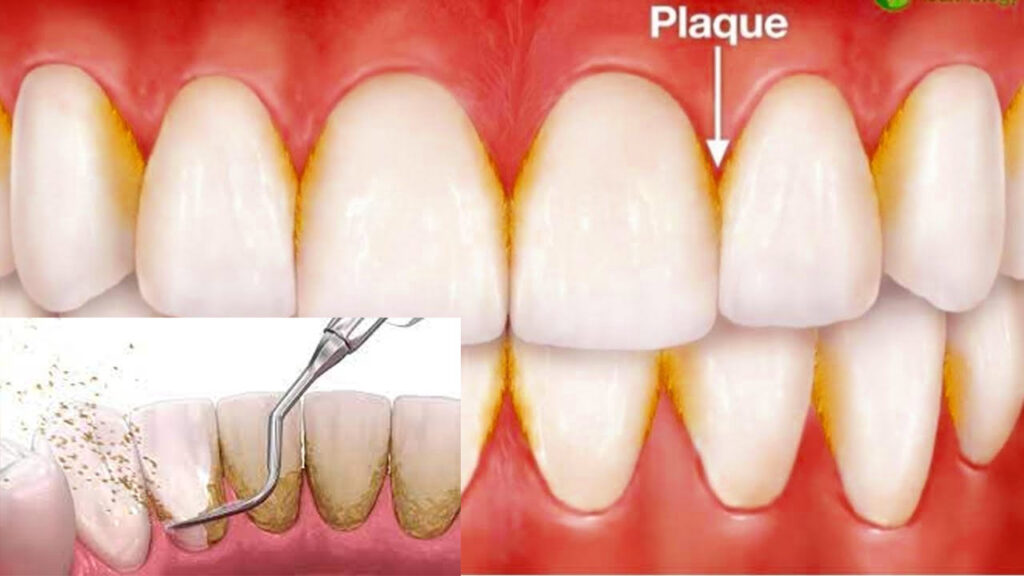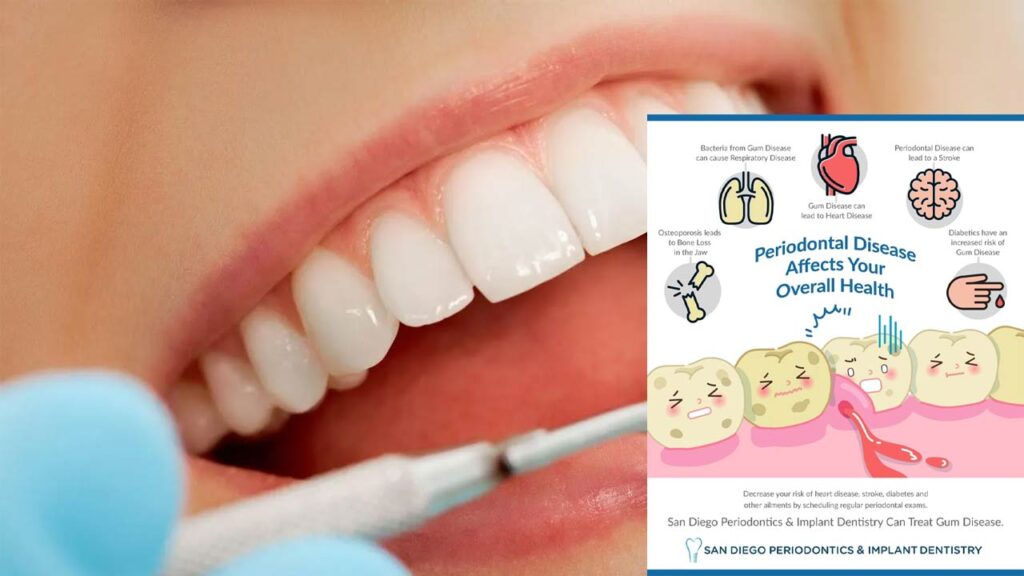Definition of dental health: Dental health refers to the overall health of the mouth, teeth, and gums.
The significance of oral hygiene: Oral hygiene is the practice of maintaining a clean and healthy mouth through brushing, flossing, and regular dental check-ups.
Importance of good dental health on overall well-being: Good dental health is essential for overall well-being as it can impact physical and mental health.
How Poor Dental Health Affects the Body
A. Tooth Decay
Causes: –
How it starts: Tooth decay starts with the build-up of plaque on the teeth, which produces bacteria and acids that attack the tooth enamel.
Plaque build-up: Plaque is a sticky film of bacteria that forms on teeth.

Bacteria and acids: The bacteria in plaque produce acids that attack the tooth enamel.
Sugar and carbohydrates: Consuming sugary and carbohydrate-rich foods and drinks can increase the risk of tooth decay.
Effects on the body: –
Cavities: Cavities are holes in the teeth caused by tooth decay.
Toothache and sensitivity: Tooth decay can cause tooth sensitivity and pain.
Abscess and infection: Untreated tooth decay can lead to abscesses and infections.
B. Gum Disease
Causes: –
Plaque and tartar build-up: The build-up of plaque and tartar can cause gum disease.
Smoking: Smoking can increase the risk of gum disease.
Diabetes: People with diabetes are more susceptible to gum disease.
Genetics: Genetics can play a role in the development of gum disease.
Effects on the body: –
Inflammation and bleeding: Gum disease can cause inflammation and bleeding of the gums.
Gum recession: Gum disease can cause the gums to recede and expose the tooth roots.
Bone and tooth loss: Advanced gum disease can lead to bone and tooth loss.
C. Halitosis
Causes: –
Poor oral hygiene: Poor oral hygiene can cause bad breath.
Smoking: Smoking can cause bad breath.
Dry mouth: Dry mouth can cause bad breath.
Certain foods and drinks: Certain foods and drinks can cause bad breath.
Effects on the body: –
Social and psychological impact: Bad breath can hurt social and psychological well-being.
Health complications (in rare cases): In rare cases, bad breath can be a symptom of underlying health complications.
healthcareDental health is an important aspect of overall health and well-being. Take control of your dental health with our top-quality dental health care products. Say goodbye to painful and inconvenient dental issues and hello to a brighter, healthier smile.
These products are designed with the latest technology and are made from premium materials, ensuring that you get the best results. Whether you’re looking for a solution for sensitive teeth, gum health, or just want to keep your smile sparkling, our dental health care products have got you covered.
Tired of hiding your smile due to yellowing, stained, or sensitive teeth?
ProDentim is here to help. This advanced formula whitens and strengthens your teeth, while also reducing sensitivity and promoting oral health. Say goodbye to expensive and painful dental treatments, and start enjoying a bright, confident smile with ProDentim.
Click Here to Try ProDentim now and see the results for yourself!
Struggling with tooth sensitivity, gum problems or bad breath?
Dentitox Pro is the solution you need. This natural, effective formula helps to clean and strengthen your teeth and gums, giving you a brighter, healthier smile. Dentitox Pro is made with the finest ingredients and is free from harmful chemicals, making it safe and gentle for everyday use. Say goodbye to pain and embarrassment, and start enjoying a confident, beautiful smile with Dentitox Pro.
Click Here to Order now and get 20% off your first purchase!
Click Here for Professional Teeth Whitening
FAQ About How Does Poor Dental Health Affect the Body
A. What causes poor dental health?
Poor dental health can be caused by several factors, including poor oral hygiene, unhealthy diet and lifestyle choices, genetics, and certain medical conditions and medications. Poor oral hygiene, such as inadequate brushing and flossing, can lead to the accumulation of plaque and bacteria on teeth, which can cause tooth decay and gum disease. Consuming sugary and acidic foods and drinks, smoking, and excessive alcohol consumption can also contribute to dental problems. Genetics can also play a role in determining susceptibility to dental problems, while certain medical conditions and medications can affect oral health as well.
B. What are the symptoms of poor dental health?
The symptoms of poor dental health may vary depending on the type and severity of the dental problem. Common symptoms of poor dental health include toothache and sensitivity, bad breath, swollen and bleeding gums, and loose or missing teeth. Other symptoms may include oral infections, persistent mouth sores, and changes in the colour or texture of the teeth or gums.
C. How can poor dental health affect overall health?
Poor dental health can have serious implications for overall health. Studies have shown that there is a link between oral health and various systemic diseases, including cardiovascular disease, respiratory infections, diabetes complications, and even dementia and cognitive decline. Poor dental health can increase the risk of developing these conditions and worsen existing ones. For example, gum disease can cause inflammation and infection, increasing the risk of developing heart disease or exacerbating existing cardiovascular problems.
D. What steps can you take to improve dental health?
To improve dental health, it is important to maintain good oral hygiene practices, such as brushing and flossing regularly, using mouthwash, and cleaning the tongue. A healthy diet that is low in sugar and acidic foods and drinks, and high in calcium and other essential nutrients can also contribute to good dental health. Avoiding tobacco and excessive alcohol consumption can also help to prevent dental problems. Additionally, seeing a dentist regularly for check-ups and cleanings can help to detect and treat dental problems early, and provide personalized advice and recommendations for maintaining good oral health.
E. When should you see a dentist?
You should see a dentist at least twice a year for check-ups and cleanings. However, if you experience any dental or oral health problems, such as toothache, sensitivity, bleeding gums, or bad breath, it is important to seek professional dental care as soon as possible. In some cases, such problems may indicate more serious dental issues that require prompt treatment.
The Importance of Regular Dental Check-ups
A. Benefits of regular dental check-ups
Regular dental check-ups are important for maintaining good oral health. They can help to detect and prevent dental problems early, such as tooth decay and gum disease. Professional cleaning and removal of plaque and tartar can also help to prevent these problems from developing or getting worse. Additionally, regular check-ups can provide an opportunity for oral cancer screening, and dentists can provide personalized advice and recommendations for maintaining good oral health.
B. How often should you visit a dentist?
For most people, it is recommended to visit a dentist every six months for check-ups and cleanings. However, some people may need to see a dentist more frequently, such as those with certain medical conditions or risk factors for dental problems. Your dentist can advise you on how often you should have check-ups based on your individual needs and dental history.
Poor dental health can have serious consequences for overall health. Maintaining good oral hygiene practices, eating a healthy diet, avoiding tobacco and excessive alcohol consumption, and seeing a dentist regularly can help to prevent and treat dental problems. Regular dental check-ups are an important part of maintaining good oral health and can provide early detection and prevention of dental issues, as well as professional cleaning, removal of plaque and tartar, and personalized advice and recommendations.
If you experience any dental or oral health problems, it’s important to see a dentist as soon as possible. For most people, visiting a dentist at least twice a year for check-ups and cleanings is recommended, but some individuals with certain conditions or risk factors may need to visit more frequently.
Remember, good dental health is not just about having a bright, white smile. It is an essential part of overall health and well-being. Taking care of your teeth and gums can help prevent serious health issues, such as cardiovascular disease, respiratory infections, diabetes complications, and even dementia and cognitive decline. By prioritizing your dental health, you can take control of your overall health and lead a happier, healthier life.
